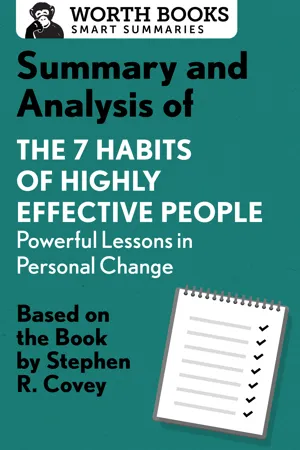Summary
Inside-Out
In his many years of working in leadership training, Covey has encountered numerous types of personal and professional problems: family and career balance; trouble meeting personal and life goals; difficulty relating to people interpersonally; and parenting and marriage troubles. Advice literature, which mostly gives tips for how to change behavior, is ultimately ineffective, Covey believes, because it does not strike at the root of the problem. In order to change how they act, people need to change how they think.
Covey uses an example from his own life as an illustration. At one point, his school-age son was struggling socially, academically, and athletically. Covey and his wife were desperate to help, and tried several methods, including positive reinforcement—when he struck out in a baseball game, they assured him, “With hard work, you’ll do better next time!” But their efforts were fruitless, and, when he did not improve, his self-esteem suffered even more. Covey realized that the problem lay not in his son’s performance, but in his and his wife’s perception of their son as somehow “inadequate.” If they wanted things to change, they had to change their perceptions. This meant valuing their son for who he was, rather than comparing him to other children or measuring him according to the expectations of others. This constituted a paradigm shift.
The Power of a Paradigm
A paradigm is a way to see the world, a model or framework for interpreting our experiences. A paradigm is a tool, a map for how to navigate circumstances. We each have two types of mental maps: one for the way things are (reality), and one for the way things should be (values). We rarely question these maps, but it is important to examine our paradigms and be open to changing them. Although we can focus on changing behaviors, without changing our paradigms, real, significant change will never happen.
The Personality and Character Ethics
Much recent self-help literature offers superficial ways to make simple changes. In contrast, older “success literature” focused on strong moral character. These two different approaches can be divided by the two “ethics.”
The Personality Ethic is mainly concerned with public image, status, and superficial interactions. It relies on simple, manipulative techniques to get people to like you, or intimidate people into respecting you.
The Character Ethic is based on principles such as integrity, humility, courage, justice, and patience. It focuses on fundamental values that drive behavior. This ethic is not concerned with social status, but with living according to universal principles of humane existence. When you base your paradigm on the Character Ethic, you learn to set goals according to these fundamental principles, and, as a result, to find a new level of thinking.
A New Level of Thinking
People who work according to an outside-in paradigm view themselves as the victims—victims of other people’s flaws, or of less-than-optimal circumstances. This paradigm operates according to the Personality Ethic. It allows people to be fooled into thinking that there are easy fixes to fundamental problems. By shifting to the paradigm of inside-out thinking, we can begin to view ourselves as responsible for our own circumstances. The inside-out approach uses core values and principles to guide all changes. In other words, all change begins with the self, and then moves outward.
Need to Know: In order to change, it’s not enough to alter our daily activities. Instead, we must shift how we view the world in general, and our own situation in particular. Inside-out thinking allows us to remake our paradigm so that decisions and actions align with core values and goals.
The Seven Habits—An Overview
Covey offers his definition of a habit as “the intersection of knowledge, skill, and desire.” To create a habit, you need the knowledge of what to do and why, the skill to be able to do it, and the desire or motivation to implement it. It can be difficult or painful to change, but the process itself can lead to happiness.
The Seven Habits function in harmony—you cannot pick and choose which habit works. They also exist on a continuum of maturity. At the low end is the paradigm of dependence, which insists, “You are responsible for what happens to me.” The more mature individual functions within the paradigm of independence, and says, “I am self-reliant and can choose to exert control over what happens to me.” Society deeply values independence, but the peak form of maturity is interdependence. Being interdependent means that you are self-reliant and have control, but that you choose to be emotionally and intellectually connected, to accept love and ideas from other people.
The Seven Habits are concerned with effectiveness. Effectiveness requires maintaining a balance between production (“P”) and production capability (“PC”). For example, in the parable of the goose that lays the golden egg, the golden egg is the “P,” or the thing that is produced. The goose is the “PC,” the asset that has the capacity to produce. If you are too focused on P and not PC, or, if you do not invest in PC, P will suffer. For example, if you run a machine too intensely, or push your workers too hard, with the intent of producing more, you will eventually find that the product is not as good: the machine will wear out or the employees will perform at substandard levels due to fatigue. P/PC balance means investing in all levels of the production process. The Seven Habits allow for optimal P/PC balance.
The habits are also sequential: one leads to the next. The first three habits establish a firm in...
